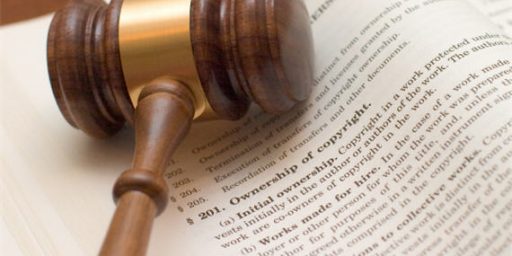Illegal Music Downloads Bring $1.9 Million Fine
 A Minnesota woman has been fined $1.9 million for downloading 24 songs from an Internet file sharing service, CNN reports.
A Minnesota woman has been fined $1.9 million for downloading 24 songs from an Internet file sharing service, CNN reports.
Jammie Thomas-Rasset’s case was the first such copyright infringement case to go to trial in the United States, her attorney said. Attorney Joe Sibley said that his client was shocked at the fine, noting that the price tag on the songs she downloaded was 99 cents. She plans to appeal, he said.
Cara Duckworth, a spokeswoman for the Recording Industry Association of America, said the association was “pleased that the jury agreed with the evidence and found the defendant liable.” “We appreciate the jury’s service and that they take this as seriously as we do,” she said.
Thomas-Rasset downloaded work by artists such as No Doubt, Linkin Park, Gloria Estefan and Sheryl Crow.
This strikes me as excessive by, oh, three orders of magnitude. Gabriel Malor notes that federal law allows fines up to $150,000 per infraction and jokes (I think) that it would have been appropriate given the defendant’s poor taste in music.
But here’s the thing: Let’s assume, for the sake of argument, that downloading a song from a pirate site is tantamount to stealing said song. What would the penalty be for stealing, say, three CDs from a record store? Surely, something much less than a $1.9 million fine?
UPDATE: By way of comparison, ostensible OTB contributor Robert Prather shares a Guardian story of a French woman sentenced to eight years in prison, of which she’ll only serve five, for murdering three children.
Photo by Flickr user debagel under Creative Commons license.





Well exactly the same as the penalty for stealing any merchandise worth … what … 40$ (haven’t bought a CD in a zillion years…)
And the idea that it’s stealing is silly. when you steal real property you deprive the owner if the use of said property. When you use IP in violation of the licenses, you do nothing of the sort. It’s not even clear if you cost the IP owner an $$$ because it is nowhere near a certainty that you would have otherwise purchased the product. I would argue that in most cases people only pirate what they would never ever dream of buying (not all but most).
The fine that was levied is exhibit “A” in the case of industry lobbyists having way too much influence on lawmakers.
I tend to agree. “Sharing” music in vast quantities presumably entices some people to ultimately buy music they wouldn’t have and is an alternative to buying for others; how the math works out, I haven’t any idea.
It’s one thing to go after the people who make mass piracy possible. But draconian measures against casual downloaders?!
When you distribute illegal copies of a song, you deprive the owner of his copyrights, and deprive him of some future revenue. If some rogue publisher started giving away free copies of a book you wrote, would you not consider that stealing?
With the decentralized state of today’s P2P technology, the ones downloading 24 songs are the ones making mass piracy possible.
A few small quibbles:
The “owner” is not often the “creator” and copyrights were intended to provide incentive to creators.
Not only that, but copyrights were always designed to expire, to revert back to the public domain so that no one owned them.
And I’ll tell you one thing…there’s no greater way to deprive an “owner” of future revenue than reverting back into the public domain.
Now you’re arguing against the industry’s composition, not copyright law.
Thomas isn’t accused of downloaded songs in the public domain.
The intent is that by the time the work is placed into the public domain, the owner has already received sufficient revenue as to allow and encourage the creation of new works.
Morally it’s stealing, because you wouldn’t go up to Bob Dylan and tell him that you loved his latest album or John Wesley Harding, and that you got it off Kazaa for free. I.e., stealth is involved. But $1.9 million is ridiculous.
Actually it’s not much an argument, but if I were to expand I’m actually arguing that copyright law is completely out of control.
To argue against the law is to ask: which iteration? Copyright law has changed many times over the years, and always in a way that makes it easier for Disney Corporation to profit off Mickey Mouse in perpetuity, even though Mickey’s creator Walt Disney has been dead for over 40 years.
Instead, I’m arguing for the original intent of copyrights: to provide an incentive to produce more works for the benefit of all. Not just the corporations who own the rights.
Comparing the price of what she downloaded to the fines is, I think, a mistake. The real question is how many people then downloaded the songs from her (which is of course impossible to determine).
I don’t get the idea that people only pirate stuff they would not otherwise buy. There is some annoyance and irritation and time factor involved in bothering to pirate materials. I can believe that people pirate stuff that they don’t want to buy at the price offered, or for convenience.
good way to pay for the stimulus and ill bet most of them are liberals, hell I’m all for it……..Fine sumtin!!!!!!!!!!!!!!!!!!!!
Her mistake was in not being a terroist or something acceptable to the liberal world. She would then end up in some cushy resort; getting to live of taxpayer money instead of having to pay.
Her second mistake was in not coming from Chicago, where these simple things are already taken care of.
Pat,
“…The real question is how many people then downloaded the songs from her (which is of course impossible to determine….”
This, of course, might occur even if she
bought them legally, no?
Only if she put her legally purchased songs on a file sharing service and made copies for others to download. That, by the way, would also still be copyright infringement.
Then support Creative Commons and other copy-left style licenses. That’s what I do.
DA and GA Philips, I’m amazed at how you’ve taken a completely non-partisan issue like copyright law, and somehow still manage to convince yourselves that the only bad guys involved are liberals. I somehow doubt that Rupert Murdoch is a closet liberal, but I’m know which side of the copyright debate Fox is on.